PEP小升初英语语法(名词)大全
【通用版】小升初英语语法复习:名词所有格(无答案)-精选教育文档

1、有生命的名词所有格
A)单数后加“ ’s ”
如:Su Hai’s twin sister苏海的双胞胎妹妹Jim’s family吉姆的一家
B)以“ s ”结尾的复数名词,只需加“ ’ ”
如:Teachers’ Day教师节the twins’ parents双胞胎的父母
C)不以“ s ”结尾的复数名词,则仍需加“ ’s ”
如:Children’s Day儿童节
注意:表示两人或几人共有的物品,只需在最后一人名后加“ ’s ”,如:Ben a nd Jim’s book 2、无生命的名词所有格,一般与“ of ”构成短语。
如:a photo of his family 他家的一张照片the colour of her skirt 她的短裙的颜色练一练:翻译下列词组:
大卫的叔叔我妹妹的邮票妇女节老师们的办公室他笔友的信
这本书的名字双胞胎的书房孩子们的爱好邮局的大门
第 1 页。
小升初英语语法大全
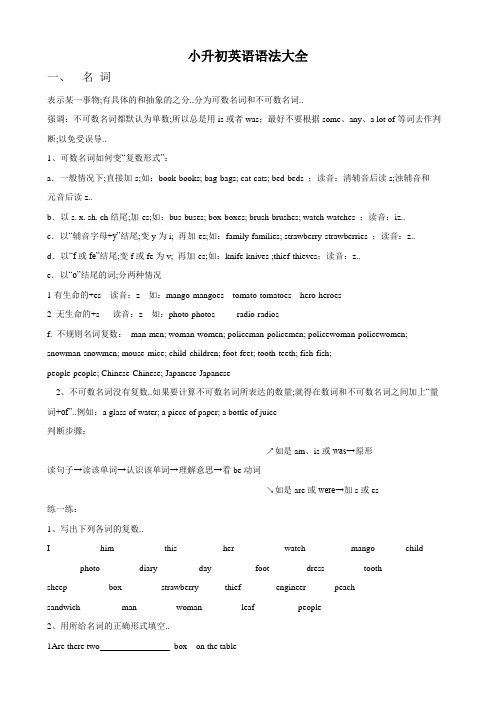
小升初英语语法大全一、名词表示某一事物;有具体的和抽象的之分..分为可数名词和不可数名词..强调:不可数名词都默认为单数;所以总是用is或者was;最好不要根据some、any、a lot of等词去作判断;以免受误导..1、可数名词如何变“复数形式”:a.一般情况下;直接加-s;如:book-books; bag-bags; cat-cats; bed-beds ;读音:清辅音后读s;浊辅音和元音后读z..b.以s. x. sh. ch结尾;加-es;如:bus-buses; box-boxes; brush-brushes; watch-watches ;读音:iz..c.以“辅音字母+y”结尾;变y为i; 再加-es;如:family-families; strawberry-strawberries ;读音:z.. d.以“f或fe”结尾;变f或fe为v; 再加-es;如:knife-knives ;thief-thieves;读音:z..e.以“o”结尾的词;分两种情况1有生命的+es 读音:z 如:mango-mangoes tomato-tomatoes hero-heroes2 无生命的+s 读音:z 如:photo-photos radio-radiosf. 不规则名词复数:man-men; woman-women; policeman-policemen; policewoman-policewomen; snowman-snowmen; mouse-mice; child-children; foot-feet; tooth-teeth; fish-fish;people-people; Chinese-Chinese; Japanese-Japanese2、不可数名词没有复数..如果要计算不可数名词所表达的数量;就得在数词和不可数名词之间加上“量词+of”..例如:a glass of water; a piece of paper; a bottle of juice判断步骤:↗如是am、is或was→原形读句子→读该单词→认识该单词→理解意思→看be动词↘如是are或were→加s或es练一练:1、写出下列各词的复数..I _________ him _________ this _______ her ______ watch _______ mango_______child_______ photo ________ diary ______ day________ foot________ dress ________ tooth_______ sheep ______ box_______ strawberry _____ thief _______ engineer______ peach______sandwich ______ man______ woman_______ leaf_______ people________2、用所给名词的正确形式填空..1Are there two box on the table2I can see some people in the cinema.3How many day are there in a week4Here’re five bottle of juice for you.5This violin is hers. Those grape are over there.二、冠词冠词是一种虚词;不能独立使用;通常放在名词的前面;分为“不定冠词”和“定冠词”两种..1、不定冠词:a、an..用在单数名词前;表示“一个;一件……”..an用在以元音“音素”开头的单词前..如:an e-mail; an orange; an old man; an English watch; an hour…2、定冠词:the..用在单数或者复数名词前..the没有具体意思;有时翻译为这、那..它的基本用法:1用来表示特指某些人或某些事物..如:The map on the wall is new.2表示说话者双方都知道的人或事物..如:Look at the picture; please.3表示再次提到前面谈过的人或事物..如:This is a stamp. The stamp is beautiful.4用在表示世界上独一无二的事物前..如:the sun太阳the moon月亮the earth地球5用在由普通名词构成的专有名词前..如:the Great Wall长城6用在江河、湖海等专有名词前..如:the Changjiang River长江7此外;序数词、形容词最高级、乐器名称等词前面和一些习惯用语中一般都用定冠词the..如:the first day; the best boy; play the piano; in the same class确定用a、an还是the时可根据汉语意思..练一练:1、用a或an填空..____ “U” ____ ice-cream ____ goalkeeper ____ teapot____apple____office ____English book ____umbrella ____unit____hour2、根据需要;填写冠词a;an或the..1Who is ____girl behind ____tree2 ____old man has two children; ____ son and ____daughter.3This is ____ orange. ____ orange is L ucy’s.4He likes playing ____guitar. We have ____same hobby.5We all had____good time last Sunday.6She wants to be____doctor.三,数词我们学过两类:基数词和序数词..基数用于表示数量多少;而基数词用于表示次序;常在日期中出现..区别:基数词前面没有“the”;序数词前一定要有“the”..1、超过二十以上的两位数需要在个位和十位之间加上“-”..如:21 twenty-one2、三位数以上的则需要在百位数后再加上and..如:101 a/one hundred and one3、用基数词来修饰可数名词时;一定别忘了它的复数形式..如:十八个男孩eighteen boys4、用基数词修饰不可数名词时;如是复数;变它的量词为复数..如:两碗米饭two bowls of rice5、序数词一般加“th”;特殊的有:first; second; third; fifth; eighth; ninth; twelfth以及二十及二十以外的整十:twentieth; t hirtieth; fortieth… “第几十几”:前面整十不变;后面“几”改为序数词..如:88 eighty-eighth练一练:1、请翻译下列短语..160名学生215本英语书3九杯凉水44个孩子512月31 66月2日7第九周840年前911+7 10上学第一天2、把下列基数词改成序数词..one--- two--- three---nine---fourteen--- twenty--- thirty-five---eighty-one四、代词代词有两种:人称代词和物主代词..1、人称代词分为:第一、第二、第三人称;且有单复数之分..2、人称代词的主格在句中做主语;一般用在动词前疑问句除外;宾格在句中做宾语;多用于动词、介词后..3、形容词性物主代词起形容词的作用;后面一定要跟名词;表示该名词是属于谁的..4、名词性物主代词=形容词性物主代词+名词..如:This is my bag. = This is mine. That is her ruler. = That is hers.一般看后面有没有名词;如有;就用形容词性物主代词;如无;就用名词性物主代词..请牢记下表:练一练:1、按要求写出相应人称代词..I宾格_______ she形容词性物主代词_______ we名词性物主代词_______ he复数_______ us单数_______ theirs主格_______ its宾格_______2、想一想;把下表补充完整..3、用所给词的适当形式填空..1That is not _________ kite. That kite is very small; but _________ is very big. I2The dress is _________. Give it to _________. she3Is this _________ watch you No; it’s not _________ . I4_________ is my brother. ________ name is Jack. Look Those stamps are _________. he5_________ dresses are red. we What colour are _________ you6Show _________ your kite; OK they7I have a beautiful cat. _________name is Mimi. These cakes are _________. it8Are these ________ tickets N o; ________ are not _________. ________ aren’t here. they9Shall _________ have a look at that classroom That is _________ classroom. we10_________ is my aunt. Do you know _________ job _________is a nurse. she11Where are _________ I can’t find _________. Let’s call _________ parents. they12Don’t touch _________. _________is not a cat; _________ is a tiger it13_________ sister is ill. Please go and see _________. she14The girl behind _________ is our friend. she五、形容词、副词1、形容词表示某一事物或人的特征;副词表示某一动作的特征..形容词和副词有三种形式:原形、比较级、最高级..比较级:+er 最高级:the …+est两个重要特征:as……as中间一定用原形;than的前面一定要+er..2、形容词、副词比较级的规则变化如下:1一般直接+er..如:tall - taller; fast - faster 单音节词如果以-e结尾;只加-r..如:late - later2重读闭音节词如末尾只有一个辅音字母;须双写这个字母;再加-er..如:big - bigger; fat - fatter3以辅音字母加-y结尾的词;变y为i;再加-er..如:heavy - heavier; early - earlier4双音节和多音节词的比较级应在原级前加more构成..如:beautiful - more beautiful;careful - more careful; quietly - more quietly; interesting - more interesting5有些不规则变化的;须逐一加以记忆..如:good/well – better; bad/ill – worse; many/much – more; far –farther/further; old –older/elder…练一练:1、写出下列形容词、副词的比较级..big good long talloldshort thin heavy youngfatlight strong high farlowearly late well fastslow2、用括号内所给单词的适当形式填空..1 I can swim as _______ fast as the fish; I think.2 Look His hands are _______ big than mine.3 I think you do these things_______ well than your classmates.4 Whose bag is _______ heavy ; yours or mine5 Does Jim run as _______slow as David Yes; but Mike runs_______ slow than them.6 You have seven books; but I have _______ many than you. I ha ve ten.7 I jump _______ far than some of the boys in my class.8 I’m very_______ thin ; but s he’s _______ thin than me.9 It gets _______and_______ warm when spring comes here.六、介词1、一种虚词..不能单独作句子成分;它只有跟它后面的宾语一起构成介词短语;才能在句子中起作用.. 有:in; on; under; with; behind; about; near; before; after; for; to; up; down; from; in front of; out of; from…to…; at the back of…2、表示时间的介词有:at; on; in..1at表示“在某一个具体的时间点上”;或用在固定词组中..如:at ten o’clock; at 9:30 a.m.; at night; at the weekend…2on表示“在某日或某日的时间段”..如:on Friday; on the first of October; on Monday morning…3in表示“在某一段时间月份、季节里”..如:in the afternoon;in Sept ember; in summer; in 2005…3、in一词还有其他的固定搭配;如:in blue穿着蓝色的衣服;in English用英语表达;take part in参加..练一练:1、选用括号内恰当的介词填空..1 What’s this _______ at; on; in English2 Christmas is _______ at; on; in the 25th of December.3 The man_______ with; on; in black is Su Hai’s father.4 He doesn’t do well _______ at; on; in PE.5 Look at those birds _______ on; in the tree.6 We are going to meet _______ at; on; in the bus stop _______ at; on; in half past ten.7 Is there a cat _______ under; behind; in the door8 Helen’s writing paper is _______ in; in front of her computer.9 We live _______ at; on; in a new house now.10 Does it often rain _______ at; on; in spring there2、圈出下列句子中运用不恰当的介词;并将正确的答案写在横线上..1 Jim is good in English and Maths.2 The films were in the ground just now.3 They are talking to their plans.4 How many students have their birthdays on May5 Women’s Day is at the third of March.6 I can jog to school on the morning.7 Did you water trees at the farm 8 Can you come and help me on my English9 I usually take photos in Sunday morning. 10 What did you do on the Spring Festival七、动词这里所说的动词是指各种动词总称;其中包括be动词、情态动词、助动词、行为动词就是我们平时总说的那种动词..动词、名词和形容词不太容易区分;如不能一眼看出;可用如下方法:先用“一量词”如:一个、一张等和这个词连起来说;如说得通;一般认为是名词;说不通再用“很”去判断;就是把“很”和为个词连起来说;说得通一般就是形容词;都说不通就是动词..目前我们学过的;以后可能不同另外一些很明显的;如人称代词、数词、情态动词等一下就可以知道1、be动词am; is; are; was; were1am—was; is –was; are--were 口诀:我用am; 你用are; is用在他她它;所有复数全用are..2肯定和否定句I am not from London. He isnot a teacher. She isnot in the dining room. My hair isnot long. Her eyes arenot small.3一般疑问句Am I a Chinese Yes; you are. No; you aren’t. Are they American Yes; they are. No; theya ren’t.Is the cat fat Yes; it is. No; it isn’t.4be动词的否定形式:am not没有缩写形式;are not = aren’t ;is not = isn’t ..用恰当的be动词填空..练一练:1、用be动词的适当形式填空..1I ______ a boy. ______ you a boy No; I _____ not. 2The girl______ Jack's sister.3The dog _______ tall and fat. 4The man with big eyes _______ a teacher.5______ your brother in the classroom 6How _______ your father7Mike and Liu Tao ______ at school. 8Whose dress ______ this9Whose socks ______ they 10Who ______ I11The jeans ______ on the desk.12Here ______ a scarf for you. 13Here ______ some sweaters for you. 14The black gloves ______ for Su Yang. 15This pair of gloves ______ for Yang Ling. 16The two cups of milk _____ for me. 17Some tea ______ in the glass.18Gao shan's shirt _______ over there. 19My sister's name ______Nancy.20______ David and Helen from England 21There ______ a girl in the room.22There ______ some apples on the tree. 23_______ there any apple juice in the bottle 24There _______ some bread on the plate. 25You; he and I ______ from China.26There _______ a boy; two girls; three men and ten women in the park.2、助动词do; does; diddo; does用于一般现在时;其过去式did用于一般过去时..它们通常用在疑问句和否定句中..它们的否定形式:do not = don’t; does not = doesn’t; did not = didn’t..注意:在一般现在时中;does用于第三人称单数;其余一律用助动词do;助动词do; does; did后面一定要用动词原形..练1、用适当的助动词填空..1 ______you like this magazine2 The girl______like bread for breakfast.3 ---What ______ she ______ at the weekends ---She usually plays games with her friends.4 ---Wha______ you do last Sunday ---I wrote to my friend.5 ---Did you see a Beijing opera ---No; I ______.6 He ______not visit a farm last National Day holiday.7 They______ not like playing volleyball.8 --- ______Jim have a picnic with his family every Saturday ---Yes; he .9 ______Helen and Yang Ling go to school on foot every day10 ---How many kites ______we have ---We have ten.2、找出下列句子中的错误;将序号填入题前括号内;并改正..1 Did you had a big lunch with your family last Spring FestivalA B C2 ---What do the boy have in his pencil-box ---He has a rubber.A B C3 They doesn’t like the film.A B C4 Do Jim get up at six everydayA B C5 Don't giving the ball to Liu Tao.A B C3、情态动词情态动词也是一类特殊的动词;平时我们不把它说成是动词..情态动词可以和行为动词同时出现在同一个句子中..我们现在学过的情态动词有:can、could、shall、should、will、would、may、might 、must..注意:情态动词后动词总是用原形..不受其他任何条件影响其否定形式:can not = can’t; must not = mustn’t; … 注意:may not和shall not无缩写形式练一练:选择填空..1 The sign on the wall means you ______stay away from the building.A. mustB. can’tC. shouldn't2 How many books ______ you see on the desk A. may B. can C. should3 It means you ______ make noise in the library. A. should B.. shouldn't C. can4 --- ______you like a glass of milk --- Yes; please. A. May B. Could C. Would5 --- ______you see the sign over there --- Sorry; I can’t. A. Can B. Can’t C. Should6 ______ we go to the park by bus A. May B. Must C. Shall4、行为动词就是我们平时上课时说的动词;表示某一动作或行为..如:sweep、live等..行为动词我们已学过它们的四种形式:原形、第三人称单数+s/es、现在分词也叫动名词+ing、过去式+ed..1动词第三人称单数变化规则:A、一般直接加“s”;如:play – plays; visit – visits; speak – speaks ;B、以“s”;“x”;“sh”;“ch”结尾时;加“es”;如:catch – catches; watch – watches ;C、以“辅音字母+y”结尾时;变“y”为“i”再加“es”;如:carry – carries; study – studies ..2现在分词动名词构成规则:A、一般直接加“ing”;如:go – going; do – doing; look – looking ;B、以不发音的“e”结尾的单词;去“e” 加“ing”;如:take – taking; make – making; have – having ;C、以重读闭音节结尾的词;如末尾只有一个辅音字母;需要双写这个字母再加“ing”;如:put – putting; stop – stopping; run – running; get – getting; swim – swimming; sit – sitting; begin – beginning; jog – jogging; forget – forgetting ..3过去式构成规则:A、一般直接加“ed”;如:plant – planted; visit – visited; pick – picked ;B、以不发音字母“e”结尾;直接加“ed”;如:like – liked; hope – hoped; taste – tasted ;C、以“辅音字母+y”结尾时;变“y”为“i”再加“ed”;如:try – tried; carry – carried; study – studied ;D、有些动词要双写最后一个字母;再加“ed”;如:stop – stopped ;E、还有很多动词的过去式是不规则的;请记忆:是-ambe-was-being;是-arebe-were-being;是-be-was; were-being;成为-become-became-becoming;开始-begin-began-beginning;弯曲-bend-bent-bending;吹-blow-blew-blowing;买-buy-bought-buying;能-can-could-----;捕捉-catch-caught-catching;选择-choose-chose-choosing;来-come-came-coming;切-cut-cut-cutting;做-do; does-did-doing;画-draw-drew-drawing;饮-drink-drank-drinking;吃-eat-ate-eating;感觉-feel-felt-feeling;发现-find-found-finding;飞-fly-flew-flying;忘记-forget-forgot-forgetting;得到-get-got-getting;给-give-gave-giving;走-go-went-going;成长-grow-grew-growing;有-have; has-had-having;听-hear-heard-hearing;受伤-hurt-hurt-hurting;保持-keep-kept-keeping;知道-know-knew-knowing;学习-learn-learned; learnt-learning;允许;让-let-let-letting;躺-lie-lay-lying;制造-make-made-making;可以-may-might----;意味-mean-meant-meaning;会见-meet-met-meeting;必须-must-must----;放置-put-put-putting;读-read-read-reading;骑、乘-ride-rode-riding;响、鸣-ring-rang-ringing;跑-run-ran-running;说-say-said-saying;看见-see-saw-seeing;将-shall-should----;唱歌-sing-sang-singing;坐下-sit-sat-sitting;睡觉-sleep-slept-sleeping;说-speak-spoke-speaking;度过-spend-spent-spending ..练一练:1、写出下列动词的第三人称单数..drink __________go ____________stay __________make __________look __________have _________pass __________carry __________come ___________watch __________plant _________fly ________ study ________brush _________do ___________teach____________ take__________ see__________2、写出下列动词的现在分词..put __________give __________fly _________get ________dance ________sit_________ run ________ plant _________take ___________swim _________ask ___________stop __________take _________write __________have __________smoke _________ think__________ want__________ tell__________3、写出下列动词的过去式..is\am _________fly _______plant ________are ________drink _________play _______go ________make ________does _________dance ________worry ___________ask ________taste _________eat __________draw ________put ______throw ________kick _________pass _______do ________4、用动词的适当形式填空..1I ______to school from Monday to Friday. My brother often _______to school with me. Yesterday we_______to school together. We like ________to school very much. go2They usually _______lunch at home. But last week; they ____lunch at school. have3That______my English book. It _____new. But now it _____not here. It ______there a moment ago. be4My sister likes ________very much. She often _______at our school festival. Last term; she _______a lot of songs in the school hall. She _____beautifully. sing5What _____ he usually ______on Sunday He usually ______his homework. LookHe __________his homework now. ______he _______his homework last SundayYes; he_______. do6Do people usually_______ moon cakes at Mid-autumn Festival Yes; they do. Did you _______moon cakes last Mid-autumn Festival Yes; I did. I _______a lot of delicious moon cakes. eat八、there/here be结构1、there be结构表示“某时、某地存在着什么事物或人”;包括there is、there are、there was、there were.. here be结构与它类似;用法也完全相同;只不过是表示“这里存在着什么事物或人”..2、和have、has、had的区别:1There be 句型表示:在某地有某物或人;而have、has、had表示:某人拥有某物..2在there be 句型中;主语是单数;be 动词用is;主语是复数;be 动词用are;如有几件物品;be 动词根据最近be 动词的那个名词决定——“就近原则”..3there be 句型的否定句在be 动词后加not ; 一般疑问句把be 动词调到句首..4there be句型与havehas 的区别:there be 表示在某地有某物或人;havehas 表示某人拥有某物.. 5some和any在there be 句型中的运用:some 用于肯定句; any 用于否定句或疑问句..6and 和or 在there be句型中的运用:and 用于肯定句; or 用于否定句或疑问句..7针对数量提问的特殊疑问句的基本结构是:How many + 名词复数+ are there + 介词短语How much + 不可数名词+ is there + 介词短语8针对主语提问的特殊疑问句的基本结构是:What’s + 介词短语9There be结构一般用在句子的开头;而have等词只能用于某一个主语后面..练一练:1、用恰当的be动词填空..1 There ______ four seasons in a year.2 There ______not any trees two years ago.3 --- ______there a post office near your school ---Yes; there ______.4 ---How many stops ______there ---There______only one.5 There ______not any stamps on the envelope.6 ______ there any birds in the tree7 There______ a shopping centre near our school last year. But now there______ no one.8 There ______only three of us: my dad; my mum and me.9 Here ______some bread for you.10 In New York; there ______ a lot of rain in spring.2、选用“have; has; had; there is; there are; there was; there were”填空..1 I ______a good father and a good mother.2 ______ a telescope on the desk.3 He ______a tape-recorder.4 ______a basketball in the playground.5 They ______ a nice garden.6 My father ______ a story-book last year.7 ______a reading-room in the building8 What does Mike ______9 ______any books in the bookcase10 How many students ______in the classroom11 ______a story-book on the table a moment ago.12 What do you ______13 My parents ______ some nice pictures.14 ______ some maps on the wall.15 ______ a map of the world on the wall.16 David’s friends ______ some tents.17 __________ many children on the hill.九、some;any的用法some用于肯定句;any用于否定句和一般疑问句..请注意看例句后扩号中说明的用法..例:There is some water in the glass. 肯定句There are some flowers in the garden. 肯定句There aren’t any lamp s in the study.否定句Are there any maps on the wall 一般疑问句Would you like some orange juice 希望得到肯定回答Do you want to take any photos at the party 一般疑问句练一练:选用some或any填空..1 There isn’t ______milk in the fridge.2 I can see______cars; but I can’t see______buses.3 He has ______ friends in England.4 Were there ______fruit trees on the farm5 Here are ______presents for you.6 Does Tom want to take ______ photos7 Is there______rice in the kitchen 8 There are______new buildings in our school.9---Would you like______ cakes ---No; I’d not like ______cakes; but I’d like ______coffee.10 ---Are there______pictures on the wall ---No; there aren’t ______pictures.十、动词不定式1、to加动词原形构成一种非谓语形式;在这里不是介词;无词义..如:I want to make a New Year card. 我想制作一张新年贺卡..Would you like to have a picnic with us 你愿意和我们一起去野餐吗2、to保留原来动词的一些特征;它可以带自己的宾语和状语等..如:To get there faster; you can take bus No.5. 想快一点到那儿;你可以坐5路车..3、to前有时带疑问词what; when; where; which; why; how等..如:He’s asking Yang Ling how to get there. 他正在问杨玲怎样到达那里..总而言之;一定要记住:to后面用动词原形..练一练:1、用扩号中所给动词的适当形式填空..1 People would like________ go to farms in the countryside.2 It’s time ________ have lunch3 I want ________ buy some presents for my friends.4 The thief began ________ run .5 Please shouw me how________ go to the shopping centre.6 Would you like ________ join us7 Don’t forget________ write “Happy New Year”.8 She was very glad________ see them.9 Please remember________ close the windows before you go home.10 I’m sorry________ hear that.2、圈出下列句子中的错误;并改正..1 Would you like go camping with us2 Helen; show ux how drawing a square.3 I want to writes a letter to my penfriend.4 It’s time for us go to school.5 Liu Tao wants to showing Peter’s photos to his mum.十一、动名词其实就是动词的“现在分词”..它既有“名词性质”可作主语;又具有动词性质可带宾语..如:Please keep quiet in the reading room. 还有我们的一些课题:Asking the way中是“名词性质”;My hobby is collecting stamps.中是“动词性质”;带了宾语stamps.1、remember记住后面跟动名词;表示“记得做过某事”;跟to+动词原形;表示“记得要去做某事”..如:I remember posting the letter today. 我记得今天把信寄走了..Please remember to post the letter today. 请记住今天要把信寄走..2、forget忘记后面跟动名词;表示“忘记做过某事实际做过”;跟to+动词原形;表示“忘记去做某事实际没做”..如:I forget doing homework this morning. 我忘记今天早上做过作业了..I forget to do homework this morning. 我忘记今天早上做作业了..3、stop停止后面跟动名词;表示“停止做某事”;跟to+动词原形;表示“停止正在做的事;而去做别的事”..如:Stop smoking; please. 请不要吸烟..We are tired. Let’s stop to have a rest. 我们累了;让我们停下来休息一下..4、like喜欢后面跟动名词;表示一个人的爱好和习惯;意思是“喜欢干某事”;跟to+动词原形;常用于would like to do something;表示“某人想要、愿意干某事”..如:I like taking a walk after supper every day. 我喜欢每天晚饭后去散步..I would like to have some chips. 我想要吃些薯条..练一练:1、用扩号内所给动词的适当形式填空..1 _________ swim is not as fast as running.2 It’s sunny today. Let’s go _________ fish .3 Do you like_________ read English in the morning4 Are you good at _________ dance5 Where is the _________ shop centre6 Would you like to go _________ jog with me7 My hobby is _________ play football.8 Su Hai likes _________ watch cartoons on Sundays.2、选择扩号内动词的适当形式填空..1 I’m sorry _________ hearing; to hear that.2 Jim is good at_________ swimming; to swim .3 Shall we go_________ skating; to skate4 Today; my work is _________ looking; to look after the baby.5 I’m going _________ flying; to fly a kite in the playground.6 I like _________ playing; to play basketball after school.7 Would you like_________ going; to go to the Great Wall8 Jim is asking Liu Tao how ________ getting; to get to the History Museum.十二、时间和日期的表达1、有两种时间表达法:A直接读写数词..如:9:15 nine fifteen 10:30 ten thirty 11:45 eleven forty-five7:05 seven o five 2:25 two twenty-five 5:55 five fifty-fiveB借助past和to来表达..past一般用于30分钟以内含30分钟的时间表达;to一般用于超过30分钟的时间表达..一刻钟可以用a quarter表示;半小时可以用half表示..如:9:15 a quarter past nine 10:30 half past ten 11:45 a quarter to twelve7:05 five past seven 2:25 twenty-five past two 5:55 five to six注意:询问时间可用句型“What’s the time ”或者“What time is it ”..2、日期的表达:the+序数词+of+月份..如:the third of June六月三日注意:询问日期可用句型“What date is it today ”或者“What’s the date today ”..练一练:1、用两种方法表达下列时间..6:45 1:589:05 3:225:50 8:302、用英语表达下列日期..五月一日九月十日三月八日四月五日七月九日八月三日一月十五日六月二日十二月二十五日3、同义句转换;每空一词..1 ---What’s the time ---It’s eleven forty-five.--- ___________is it ---It’s ___________ .2 It’s seven o five. It’s time for breakfast.It’s___________. It’s time ___________.3 ---What’s the date today ---It’s 1st October.--- ___________is it today ---It’s ___________十三、名词所有格1、有生命的名词所有格:A单数后加“ ’s ”;如:Su Hai’s twin sister苏海的双胞胎妹妹Jim’s family吉姆的一家B以“ s ”结尾的复数名词;只需加“ ’ ”;如:Teachers’ Day教师节the twins’ parentsC不以“ s ”结尾的复数名词;则仍需加“ ’s ”;如:Children’s Day儿童节注意:表示两人或几人共有的物品;只需在最后一人名后加“ ’s ”;如:Ben and Jim’s book2、无生命的名词所有格;一般与“ of ”构成短语..如:a photo of his family 他家的一张照片the colour of her skirt 她的短裙的颜色练一练:翻译下列词组:大卫的叔叔我妹妹的邮票妇女节老师们的办公室他笔友的信这本书的名字双胞胎的书房孩子们的爱好邮局的大门十四、句子的种类练一练:1、填入适当的疑问词..1 _______wallet is it It’s mine.2 _______is the Christmas Day It’s on the 25th of December.3 _______is the diary It’s under the chair.4 _______ is the boy in blue He’s Mike.5 _______are the earphones They are 25 yuan.6 _______is the hair dryer It’s blue.7 _______is it today It’s Sunday.8 _______was it yesterday It was the 13th of October.9 _______this red one It’s beautiful.10 _______is it from here It’s about 2 kilometres away.11 A: Can I have some paper and some crayons B: _______ A: I want to make a kite.12 _______is your cousin He’s 15years old.13 _______ do you have dinner At 6 o’clock.14 _______one is fatter; the blue one or the red one The blue one.2、对划线部分提问..1 I can see eight rubbers in the box._______ _______ _______ can_______see in the box 2 My father is fine today._______ _____ your father today3 Liu Tao is playing football in the playground._______ ____ Liu Tao _______ in the playground4 The films were on the ground._______ _______ the films5 The girl with big eyes is my sister’s friend._______ _____ _______ sister’s friend6 My birthday is on the 9th of September._______ _____ your birthday7 I’d like a nice cake for breakfast._______ _____ _______ like for breakfast8 That’s Nancy’s skirt._______ _______ is that3、按要求改写句子..1 It’s a book.改为一般疑问句___ it a _______2 My father is in the study.对划线部分提问_______ is _______ father3 Do you watch TV every Sunday 做肯定回答_______ ; I _______.4 This picture is beautiful.改为以what引导的感叹句What ___ __________picture5 Open the door for him.改为否定句_______ open ___ ___ for _______6 I have a big present.对划线部分提问_______ do you _______肯定句否定句一般疑问句及回答He is running now. He isn’t running now. ---Is he running now---Yes; he is. / No; he isn’t.They are making a puppet. They aren’t making a puppet. ---Are they making a puppet---Yes; they are. / No; they aren’t.7 There are some orange trees.改为单数句子There _______ _______ orange _______ .8 we are going to see a Beijing opera.对划线部分提问What _______you _______ ____ do9 He has some questions.改为一般疑问句_______ he _______ _______ questions10 They visited their relatives and friends last Spring Festival.改为一般疑问句_____ they _______ their relatives and friends last Spring Festival十五、时态1、一般现在时A、当谓语是be动词时;构成为:主语+be动词am; is; are +其他..如:I am a student.B、当谓语是行为动词时;构成有两种:1主语非第三人称单数+动词原形+其他..如:We often watch TV at the weekends.2主语第三人称单数+动词第三人称单数形式+其他..如:Jim usually goes to the park on Sundays.C、句型变换:肯定句否定句一般疑问句及回答They watch TV at six everyday. They don’t watch TV at six everyday.---Do they watch TV at six everyday.---Yes; they do. / No; they don’t.She watches TV at six everyday. She doesn’t watch TV at six everyday.---Does she watch TV at six everyday.---Yes; she does. / No; she doesn’t.练一练:A、用括号内动词的适当形式填空..1 He often ______ have dinner at home.2 Daniel and Tommy ______ be in Class One.3 We ______ not watch TV on Monday.4 Nick ______ not go to the zoo on Sunday.5 ____they ______ like the World Cup6 There be some water in the bottle.7 ____your parents _____ read newspapers every day8 Mike______ like cooking.9 You always ______ do your homework well. 10 They ______ have the same hobby.11 My aunt ______ look after her baby carefully. 12 Liu Tao ______ do not like PE.13 She and I ______ take a walk together every evening.B、按要求转换句子;每空一词..1 Tom likes playing basketball with his friends. 改成否定句Tom_____ ______ playing basketball with his friends.2 David’s parents often take a walk after supper. 改为一般疑问句并作出否定回答--- ______David’s parents often ______ a walk after supper --- No; ______ ______.3 They usually watch TV. 对划线部分提问______ ______ they usually ______4 She is always a good student. 改为一般疑问句并作出肯定回答--- ___ ______ always a ______ student --- ______ ; ______ ______ .5 Simon and Daniel like going skating. 改为否定句Simon and Daniel ______ ______ going ______.2、现在进行时A、构成形式:主语+be动词+动词的ing形式+其他..B、判断依据:句中往往有now、look、listen等词..注意:千万不要忘了一定得有be动词..C、句型变换:练一练:A、用所给的动词的正确形式填空..1 The boy ______ ______ draw a picture now.2 What______you ______ do now3 Listen. Some girls ______ ______ sing in the classroom.4 My mother ______ ______ cook some nice food now.5 Look. They ______ ______ have an English lesson.6 They ______ ______ not water the flowers now.7 Look the girls ______ ______ dance in the classroom .8 What is our granddaughter doing She ______ ______ listen to music.9 ______ Helen ______ wash clothes Yes; she is .B、根据中文;完成句子;每空一词..1 刘涛的父亲正在浇花..Liu Tao’s father is ______ ______.2 看;孩子们正在操场上踢足球..Look The children ______ ______ ______ in the playground.3 她正在公园里散步吗是的..--- _____ she______a walk in the park ---Yes; she______.4 Jack正在哪读书在他书房..--- ______ ______ Jack ______ the book now ---He is______ ___ ___ ______.3、一般过去时A、构成形式:主语+动词的过去式+其他..注意:没有be动词的否定句和疑问句中;用didn’t否定和用did提问后;动词一定要用原形..B、判断依据:1be动词是was、were;2动词加ed;3有表示过去的时间状语;现在学过的常用的表示过去的时间状语有:just now;a moment;yesterday;last week;last night;last weekend;last year;last month;three days ago;two weeks ago;five years ago…。
小升初语法-名词(讲义)通用版英语六年级下册

小学英语语法知识汇总——名词篇什么是名词?名词是表示人、物、行为、感情、地点以及抽象概念的词。
它可以是具体的,也可以是抽象的。
一、名词的作用名词分为普通名词和专有名词两大类,一般在句子中作主语、宾语或表语等1.名词作主语例: English is my favourite subject.2.名词作宾语例: I like this book.3.名词作表语例:He is a boy.二、名词的分类接下来,对上述分类做详细讲解。
三、专有名词表示某一特定的人、日期、事物、地点或机构等专有名称的词叫专有名词。
1.人名例: John 约翰Alice 爱丽丝Harry Potter 哈利-波特2.月份例: January一月February二月April 四月3星期例:Monday 星期一Tuesday 星期二Wednesday 星期三4.节日例: Christmas 圣诞节Easter 复活节Mother's Day 母亲节5.学科,语言例: Chinese 中文English 英语Maths 数学6.品牌例: Teddy Bear 泰迪熊7.国家,城市例: China 中国Beijing 北京Japan 日本四、普通名词普通名词是指一类人、事物、物质或抽象概念的名称。
它又可以细分为个体名词、集体名词、物质名词和抽象名词四类。
1.个体名词:表示单个的人和事物例: rubber 橡皮photo 照片student 学生2.集体名词:表示一群人或一些事物的名词例: group 集团family 家庭class 班级3.物质名词:表示无法分为个体的物质。
例:fire 火water 水air 空气4.抽象名词:表示动作、状态、品质、情况等抽象概念。
例: health 健康life 生活patience 耐心名词还可分为可数名词与不可数名词。
五、可数名词。
可数名词指能以数目来计算,可分成个体的人或东西。
可数名词有“单数”与“复数”之分。
小升初英语语法-名词的所有格
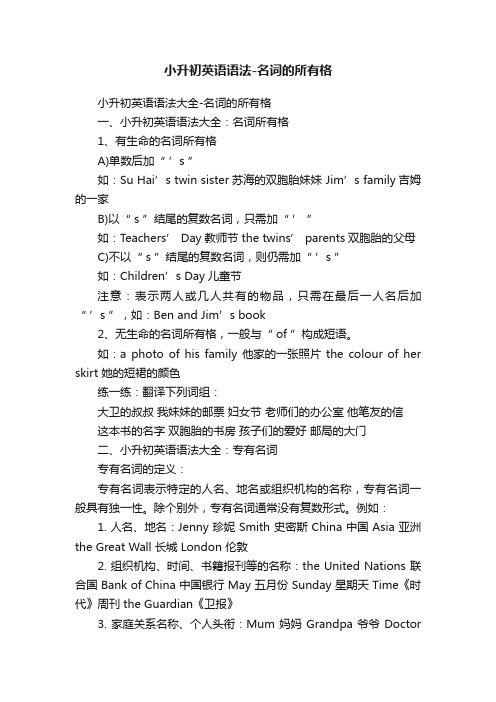
小升初英语语法-名词的所有格小升初英语语法大全-名词的所有格一、小升初英语语法大全:名词所有格1、有生命的名词所有格A)单数后加“ ’s ”如:Su Hai’s twin sister苏海的双胞胎妹妹Jim’s family吉姆的一家B)以“ s ”结尾的复数名词,只需加“ ’ ”如:Teachers’ Day教师节the twins’ parents双胞胎的父母C)不以“ s ”结尾的复数名词,则仍需加“ ’s ”如:Children’s Day儿童节注意:表示两人或几人共有的物品,只需在最后一人名后加“ ’s ”,如:Ben and Jim’s book2、无生命的名词所有格,一般与“ of ”构成短语。
如:a photo of his family 他家的一张照片the colour of her skirt 她的短裙的颜色练一练:翻译下列词组:大卫的叔叔我妹妹的邮票妇女节老师们的办公室他笔友的信这本书的名字双胞胎的书房孩子们的爱好邮局的大门二、小升初英语语法大全:专有名词专有名词的定义:专有名词表示特定的人名、地名或组织机构的名称,专有名词一般具有独一性。
除个别外,专有名词通常没有复数形式。
例如:1. 人名、地名:Jenny 珍妮 Smith 史密斯 China 中国 Asia 亚洲the Great Wall 长城 London 伦敦2. 组织机构、时间、书籍报刊等的名称:the United Nations 联合国 Bank of China 中国银行 May 五月份 Sunday 星期天 Time《时代》周刊 the Guardian《卫报》3. 家庭关系名称、个人头衔:Mum 妈妈 Grandpa 爷爷 DoctorBlack 布莱克大夫 Captain Grey 格雷船长 Mr. Hopkins 霍普金斯先生Miss White 怀特小姐专有名词的注意事项:1. 因为专有名词具有专有独一性,所以一般情况下,专有名词的第一个字母要大写,不能在专有名词的前面加上不定冠词"a",也不能在专有名词词尾加上表示复数形式的"-s"。
人教版(PEP)小升初英语名词知识点梳理课件
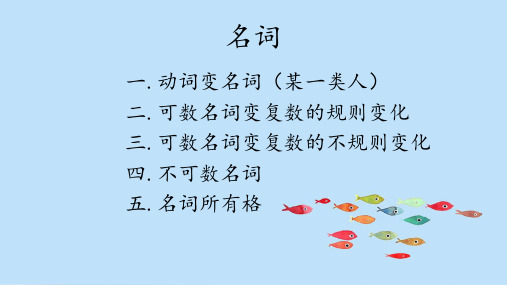
三.可数名词变复数的不规则变化
man-men
woman-women
foot-feet
tooth-tep-sheep
deer-deer
child-children
ChineseChinese
German-Germans a woman doctor-two a apple tree-two
1. 's 所有格
情况 一般情况 以是结尾的名词 几个人共同拥有某 样东西 每个人分别拥有某 样东西
五.名词所有格
改法
例子
名词末尾加‘s
the Children's Day
名词末尾加’
his parents' room
最后一个所有者后 Tom and Tim's book 面加's
每个所有者后面加's Tom's and Tim's book
2.of 所有格 :A of B: B 的 A
例:a photo of my father :我父亲的一张照片
综合练习
1. The______ has two _______ . A. boys; watches B. boy; watch C. boy; watches
2. The old man wants __________. A. six boxes of apples B. six box of apples C. six boxs of apples
3. They are_______. A. woman teachers B. women teachers C. women teacher
PEP版六年级英语下册 小升初英语语法知识复习全面汇总 精品

一、词类:动词、名词和形容词不太容易区分,如不能一眼看出,可用如下方法:先用“一(量词)”(如:一个、一张等)和这个词连起来说,如说得通,一般认为是名词;说不通再用“很”去判断,就是把“很”和为个词连起来说,说得通一般就是形容词;都说不通就是动词。
(目前我们学过的,以后可能不同)(另外一些很明显的,如人称代词、数词、情态动词等一下就可以知道)1、动词这里所说的动词是指各种动词总称,其中包括行为动词(就是我们平时总说的那种动词)、be动词、情态动词。
(1)行为动词就是我们平时上课时说的动词,表示某一动作或行为。
如:sweep、live 等。
行为动词我们已学过它们的四种形式:原形、+s/es、+ed、+ing,具体判断方法如下:↗有,就加ing读句子→读该单词→认识该单词→理解意思→看有无be动词(若是be going to 就用原形)↘没有,再看情态动词↗有,就用原形↗有,就加ed↘没有,再看有无表示过去的时间状语↗是第三人称单数就加s或es↘没有,再看主语↘不是第三人称单数就用原形(2)be动词a、Am--was Is --was Are--were 口诀:我用am, 你用are, is用在他她它,所有复数全用are。
b、肯定和否定句I am (not) from London. He is(not) a teacher. She is(not) in the dining room. My hair is(not) long. Her eyes are(not) small.c、一般疑问句Am I a Chinese? Yes, you are. No, you aren’t. Are they American? Yes, they are. No, they aren’t. Is the cat fat? Yes, it is. No, it isn’t.我们现在学过的be动词大致分两类:is、am、are为一类,一般用于一般现在时、现在进行时和一般将来时中,was和were为另一类,一般用于一般过去时。
小升初英语语法知识点归纳
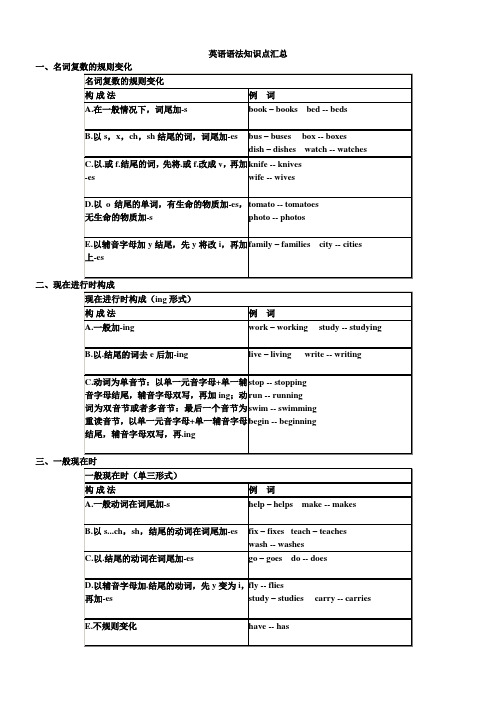
英语语法知识点汇总二、现在进行时构成四、一般过去时PEP教材四会句型汇总一、一般疑问句1.--.Di.yo.rea.book.你读书了吗?--.Yes..did.是的, 我读过了。
.No..didn't.不, 我没有读过。
2.--.I.sh.quie.她文静吗?--.No.sh.isn't.She'.ver.active.不,她不。
她很活跃。
--- Is she strict 她严格吗?--.Yes.sh.is.bu.she'.ver.kind.是的, 她是, 但是她很和蔼。
3.--.I.thi..teacher'.des.这是一张讲台桌吗?.I.i.col.冷吗?.I.he.birthda.i.Jun.她的生日在六月吗? .I.thi.you.T-shir.这是你的T恤衫吗?--.Yes.i.is.是的。
.No.i.isn't.(No.it'.not..不, 不是的。
4.--.Ca.yo.mak.th.be.你会铺床吗?pute.你会使用电脑吗?--.Yes..can.是的, 我会。
.No..can't. 不, 我不会。
5.--.Ar.the.duck.它们是鸭子吗?.Ar.the.eatin.th.hone.它们吃蜂蜜吗?--.Yes.the.are.是的, 它们是。
.No.the.aren't.不, 它们不是。
6.--.I.ther..fores.i.th.par.公园里有一个森林吗? .I.ther..rive.那里有条河吗?--.Yes.ther.is.是的, 那里有。
.No.ther.aren't.不, 那里没有。
7.--.Ar.ther.an.panda.i.th.mountain.山里有一些熊猫吗?.Ar.ther.an.fis.i.th.river.河里有一些鱼吗?--.Yes.ther.are.是的, 那里有。
六年级小升初英语知识点pep
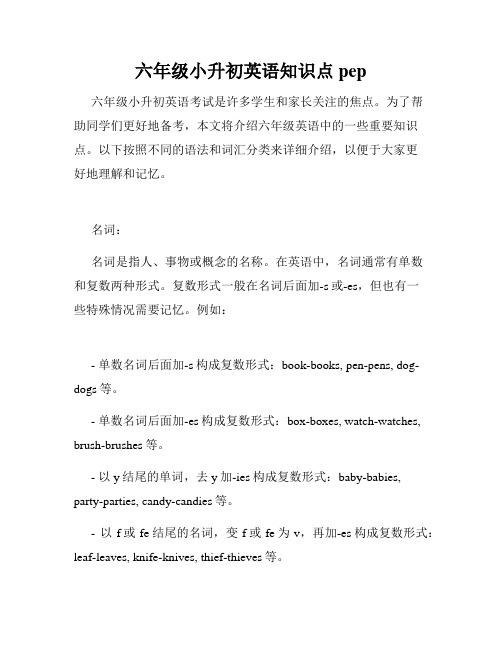
六年级小升初英语知识点pep 六年级小升初英语考试是许多学生和家长关注的焦点。
为了帮助同学们更好地备考,本文将介绍六年级英语中的一些重要知识点。
以下按照不同的语法和词汇分类来详细介绍,以便于大家更好地理解和记忆。
名词:名词是指人、事物或概念的名称。
在英语中,名词通常有单数和复数两种形式。
复数形式一般在名词后面加-s或-es,但也有一些特殊情况需要记忆。
例如:- 单数名词后面加-s构成复数形式:book-books, pen-pens, dog-dogs等。
- 单数名词后面加-es构成复数形式:box-boxes, watch-watches, brush-brushes等。
- 以y结尾的单词,去y加-ies构成复数形式:baby-babies,party-parties, candy-candies等。
- 以f或fe结尾的名词,变f或fe为v,再加-es构成复数形式:leaf-leaves, knife-knives, thief-thieves等。
动词:动词是指表示行为或状态的词语。
根据时态和语态的不同,动词的形式和用法也会有所不同。
- 一般现在时:用于描述经常发生的动作、现在的状态或真理。
例如:I go to school every day.(我每天去学校。
)- 现在进行时:用于表示现在正在进行的动作。
现在进行时的动词由be动词(am, is, are)和动词的现在分词构成。
例如:He is playing basketball now.(他正在打篮球。
)- 一般过去时:用于过去某个时间发生的动作。
一般过去时的动词通常是在动词原形后面加-ed构成。
例如:We visited the museum yesterday.(昨天我们参观了博物馆。
)- 一般将来时:用于表示将来要发生的动作或事件。
一般将来时的动词前面要加助动词will。
例如:I will study harder next year.(明年我将更加努力学习。
小升初英语语法大全与必背知识点
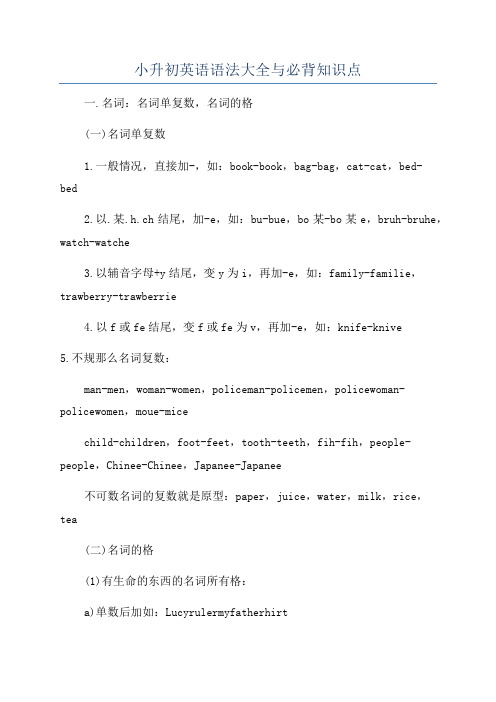
小升初英语语法大全与必背知识点一.名词:名词单复数,名词的格(一)名词单复数1.一般情况,直接加-,如:book-book,bag-bag,cat-cat,bed-bed2.以.某.h.ch结尾,加-e,如:bu-bue,bo某-bo某e,bruh-bruhe,watch-watche3.以辅音字母+y结尾,变y为i,再加-e,如:family-familie,trawberry-trawberrie4.以f或fe结尾,变f或fe为v,再加-e,如:knife-knive5.不规那么名词复数:man-men,woman-women,policeman-policemen,policewoman-policewomen,moue-micechild-children,foot-feet,tooth-teeth,fih-fih,people-people,Chinee-Chinee,Japanee-Japanee不可数名词的复数就是原型:paper,juice,water,milk,rice,tea(二)名词的格(1)有生命的东西的名词所有格:a)单数后加如:Lucyrulermyfatherhirtb)以结尾的复数名词后加如:hifriendbagc)不以结尾的复数后加childrenhoe并列名词中,如果把加在最后一个名词后,表示共有,如:TomandMikecar汤姆和迈克共有的小汽车要表示所有物不是共有的,应分别在并列名词后加TomandMikecar汤姆和麦克各自的小汽车(2)表示无生命东西的名词通常用of+名词来表示所有关系:如:apictureoftheclaroomamapofChina二.冠词:不定冠词,定冠词种类:(1)不定冠词:a/anaunit/anuncle元音开头的可数名词前用an:anegg/anapple/anorange/aneraer/ananwer/anIDcard/analarmclock /anactor/anactre/ane-mail/anaddre/anevent/ane某ample/anopera/anhouranoldman/aninteretingbook/ane某citingport/anactionmovie/anartleon/(2)定冠词:thetheeggtheplane2.用法:定冠词的用法:(1)特指某(些)人或某(些)物:Therulerionthedek.(2)复述上文提到的人或物:Hehaaweater.Theweaterinew.(3)谈话双方都知道的人或物:Theboyarentatchool.(4)在序数词前:JohnbirthdayiFebruarytheecond.(5)用于固定词组中:inthemorning/afternoon/evening不用冠词的情况:(1)专有名词前:Chinaiabigcountry.(2)名词前有定语:thi,that,my,your,ome,any,no等:Thiimybaeball.(3)复数名词表示一类人和事:Monkeycantwim.Theyareteacher.(4)在节日,日期,月份,季节前:TodayiChritmaDay.ItSunday.(5)一日三餐前:Wehavebreakfatat6:30.(6)球类棋类运动前:Theyoftenplayfootballaftercla.Heplaycheathome.某但乐器前要用定冠词:Iplaytheguitarverywell.(7)学科名称前:Myfavoriteubjectimuic.(8)在称呼或头衔的名词前:ThiiMrLi.(9)固定词组中:atnoonatnightbybu三、代词:人称代词,物主代词人称代词物主代词主格宾格第一人称单数I(我)memy(我的)复数we(我们)uour(我们的)第二人称单数you(你)youyour(你的)复数you(你们)youyour(你们的)第三人称单数he(他)himhi(他的)he(她)herher(她的)it(它)itit(它的)复数they(他们/她们/它们)themtheir(他们的/她们的/它们的)四、形容词,副词:比较级,最高级(一)、形容词的比较级1、形容词比较级在句子中的运用:两个事物或人的比较用比较级,比较级后面一般带有单词than。
(PEP)六年级英语下册 小升初英语(全国通用)复习 名词
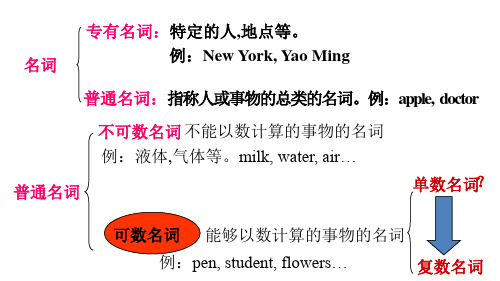
3.集体名词,以单数形式出现,但实为复数。例如: people,police,cattle 等本身就是复数,不能说 a people,a police,a cattle,但可以说a person,a
policeman,a head of cattle, the English,the British,the French,the Chinese,the Japanese,the Swiss 等名词,表 示国民总称时,作复数用,如:The Chinese are industrious and brave. 中国人民是勤劳勇敢的。
d. 以复数形式出现的书名,剧名,报纸,杂志名,也可视 为单数。例如:
注意:由一个词加 man 或 woman构成的合成词,其复 数形式也是 men 和women,如:an Englishman-two Englishmen;但German不是合成词,故复数形式为 Germans;Bowman是姓,其复数是the Bowmans。
2.单复同形,如deer,sheep,fish,Chinese,Japanese ,yuan。 但除人民币的元、角、分外,美元、英镑、法郎等都有
⑤专有名词以y结尾或元音字母加y结尾的名词 变复数时,直接加-s变复数。如:monkeymonkeys,holiday-holidays
⑥以o 结尾的名词,变复数时:
a. 加-s,如: photo-photos,piano-pianos,radioradios,zoo-zoos
b. 加-es,如:potato-potatoes,tomato-tomatoes
名词单数变复数的发音规则
情况
构成方法
以-s , -x,
-sh , -ch , 结尾的 名词
小升初英语语法 名词

常见的不可数名词
① 食物类
bread 面包 chicken 鸡肉
meat 肉
book
找出不可数名词
cow
tree
dollar
paper
找出不可数名词
desk
fish
money
boy
不可数名词的特征
1. 不与a/an连用 2. 不能变复数 3. 与可数名词单数用法一致
真题再现
1. I’m hungry. I would like a ________.
A. bread
名词变复数
不规则
芒果是个两面派,加s,es都正确 绵羊鱼鹿永不变 鹅的脚上长了牙,要把oo变ee 男人女人a变e 小孩后面加个人 老鼠的复数是mice
名词变复数
复合名词 apple tree - apple trees picture book - picture books boy student - boy students girl student - girl students man doctor - men doctors woman teacher - women teachers
2.We have bought two ________ for the coming party.
A. box of apple
B. boxes of apples
C. box of apples
D.boxes of apple
小升初英语语法-名词

小升初英语语法-名词一、名词(一)名词的分类名词类别意义例词专有名词表示具体的人名、事物、国家、地名、机构、团体等的专有名称Jim, China,Qingdao, the UnitedKingdom, the GreatWall普通名词可数名词个体名词表示单个人的人或事物girl, student, factory,desk, cat, country 集合名词表示一群人或一些事物的总称people, police, team,clothes, group 不可数名词物质名词表示无法分为个体的物质water, ice, pork,cheese, cotton, air 抽象名词表示抽象概念的词fun, healthy,happiness, courage,love, care【注】:专有名词(1)专有名词中实词的第一个字母要大写,专有名词前一般不加冠词,但由普通名词构成的专有名词前要加定冠词“the”,“the”不大写,例如:Beijing, the People’s Republic of China,the Great Wall(2)姓氏名如果采用复数形式,则表示该姓氏一家人(复数含义),如:the Greens( 格林一家人)。
(3)节日中传统节日前要加“the”,其余不加“the”,如:the Spring Festival, Mother’s Day(二)名词的数:表示可以计算数目的人或物称为可数名词。
1、可数名词有单、复数两种形式:可数名词的单数形式要在名词前加“a或an”;复数形式是在名词后加“-s或-es”。
名词复数形式有规则变化和不规则变化两种,规则变化及其读音可依照下表:当名词为:词尾变化读音例词一般情况加s 在清辅音后读/s/ chips, jeeps, maps, clocks在浊辅音或元音后读/z/ boys, sharpeners, sofas, bags以ce, se, se,(d)ge结尾的词读/iz/oranges, 以t结尾的加s读/ts/以d结尾的加s 读/dz/ cats, kites hands, grades以s,x,ch,sh结尾的单词加es /iz/watches, boxes,classes, brushes注:stomach-stomachs以辅音字母+y 结尾的单词去y 变i加es/z/dictionaries,strawberries,元音字母加y结尾的名词,则只须加s,如:monkey--monkeys。
小升初六年级英语语法知识点复习归纳--名词 全国通用

子), gloves(手套), shoes(鞋子), shorts(短裤), stockings(长筒袜) 四.名词的所有格 1. 可数名词 (1)定义和两种形式 名词所有格是名词中表示所有关系的形式,意为“......的”。所有格的构成有两 种形式:一是由名词加’s 构成,通常用来表示有生命的东西;二是 of 加名词 构成,通常表示没有生命的东西。
小升初六年级英语语法知识点复习归纳
名词
一.名词的定义 表示人或物,地点,行为,感情以及抽象概念的词。它既可以是具体的,也可 以是抽象的。 二.名词的分类 名词分为专有名词和普通名词两大类。 1. 专有名词 表示具体的特定的人,地名,月份,星期,节日,报刊杂志等的名称。 特 征 : ( 1) 书 写 时 第 一 个 字 母 通 常 要 大 写 。 ( 2) 一 般 情 况 不 需 要 冠 词 (a/an/the)修饰,个别需要定冠词 the 修饰。 人名 Mr Zhang 张先生 Liu Dehua 刘德华 地名 Italy 意大利 Beijing 北京 the Summer Palace 颐和园 其他 July 七月 Saturday 星期六 New Year’s Day 元旦 Christmas Day 圣诞节 Children’s Day 儿童节 English Weekly 英语周报 Olympic Games 奥运会 2. 普通名词 表示一类人,事物或者抽象概念的名词。 特征:前面可以加上不定冠词 a/an 或者定冠词 the,也可以不加冠词。 普通名词可分为四类:
Henrys Germanys Marys
wife-wives(妻子) knife-knives(小刀) wolf-wolves(狼) thief-thieves(小偷) shelf-shelves(书架) self-selves(自己)
小升初英语名词所有格语法

小升初英语名词所有格语法小升初英语名词所有格语法(1)名词所有格一般是词尾加′s构成,如:the boy’s bag;our teacher’s room等。
如果原词已经有复数词尾-s,则仅仅加一个(′)即可,如boys′ school等。
词尾无s的复数名词则仍要加′s,如:men’s clothes等。
(2)表示无生命东西的名词的所有格不可用词尾加(′s)或(′),而是用of 属格,如:the window of the room等。
但在表示时间、距离以及其他习惯用语中,则需用(′s)或(′)表示所有格,如:ten minutes′ walk等。
(3)如果一样东西为两人共有,则只在后一个名词后加“'s”。
如:We visited Xiao Li and Xiao Zhang's room. 我们参观了小李和小张的房间。
(4)名词的双重所有格。
(本部分只出现在教师版中)物主代词不可与a, an, this, that, these, those, some, any, several, no, each, every, such,another, which等词一起修饰一个名词,而必须用双重所有格。
公式为:a, an, this, that +名词+of +名词性物主代词。
如:a friend of mine 我朋友中的一个each brother of his 他的每个哥哥中考英语语法学习口诀:名词所有格用法名词所有格用法【速记口诀】名词所有格,表物是“谁的”,若为生命词,加“’s”即可行,词尾有s,仅把逗号择;并列名词后,各自和共有,前者分别加,后者最后加;若为无生命词,of所有格,前后须倒置,此是硬规则。
【妙语诠释】①有生命的名词所有格一般加s,但如果名词以s结尾,则只加“’”;②并列名词所有格表示各自所有时,分别加“’s”,如果是共有,则只在最后名词加“’s”;③如果是无生命的名词则用of 表示所有格,这里需要注意它们的顺序与汉语不同,A of B要翻译为B 的A。
(完整版)最全小升初英语语法点(总结及练习)
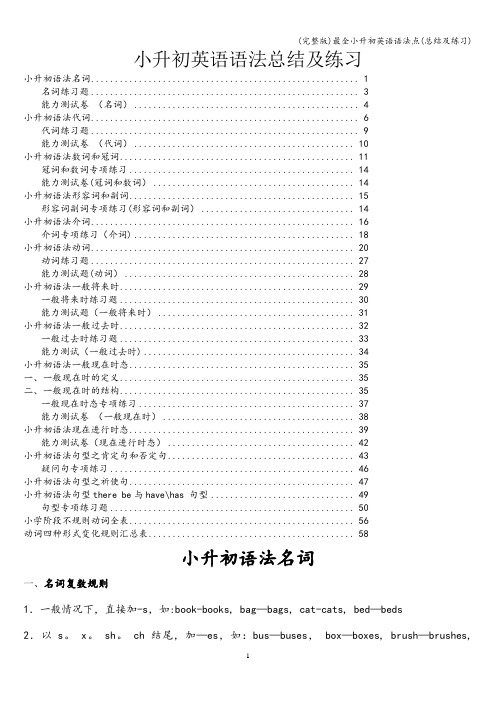
小升初英语语法总结及练习小升初语法名词 (1)名词练习题 (3)能力测试卷(名词) (4)小升初语法代词 (6)代词练习题 (9)能力测试卷(代词) (10)小升初语法数词和冠词 (11)冠词和数词专项练习 (14)能力测试卷(冠词和数词) (14)小升初语法形容词和副词 (15)形容词副词专项练习(形容词和副词) (14)小升初语法介词 (16)介词专项练习(介词) (18)小升初语法动词 (20)动词练习题 (27)能力测试题(动词) (28)小升初语法一般将来时 (29)一般将来时练习题 (30)能力测试题(一般将来时) (31)小升初语法一般过去时 (32)一般过去时练习题 (33)能力测试(一般过去时) (34)小升初语法一般现在时态 (35)一、一般现在时的定义 (35)二、一般现在时的结构 (35)一般现在时态专项练习 (37)能力测试卷(一般现在时) (38)小升初语法现在进行时态 (39)能力测试卷(现在进行时态) (42)小升初语法句型之肯定句和否定句 (43)疑问句专项练习 (46)小升初语法句型之祈使句 (47)小升初语法句型there be与have\has 句型 (49)句型专项练习题 (50)小学阶段不规则动词全表 (56)动词四种形式变化规则汇总表 (58)小升初语法名词一、名词复数规则1.一般情况下,直接加-s,如:book-books, bag—bags, cat-cats, bed—beds2.以s。
x。
sh。
ch结尾,加—es,如:bus—buses, box—boxes, brush—brushes,watch—watches3.以“辅音字母+y”结尾,变y为i, 再加-es,如:family—families, strawberry-strawberries以“元音字母+y”结尾,直接加s,如:boy — boys ,day — days4。
以“f或fe”结尾,变f或fe为v,再加-es,如:knife—knives5.以o结尾的单词:a,有生命的+es b, 无生命+s如:potato—-potatoes ; hero-—heroes;mango-—mangoesphoto——photos ; radio —- radios ; video -- videos 6. 不规则名词复数:man-menwoman-women policeman—policeme nmouse—mice child—children foot-feettooth-teethfish—fishpeople—peopleChinese—Chinese Japanese—Japanesedeer - deersheep—sheeppolicewoman-policewomen二、名词所有格的构成法1. 主要是在词尾加’ s 构成。
小升初英语语法复习要点归纳(PEP版)
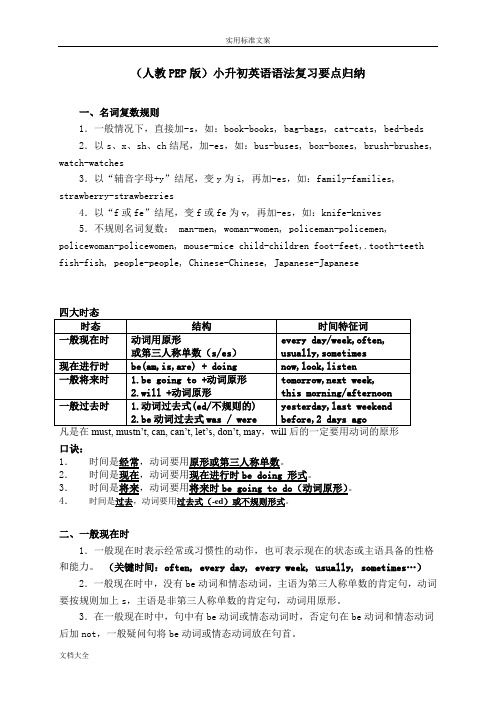
(人教PEP版)小升初英语语法复习要点归纳一、名词复数规则1.一般情况下,直接加-s,如:book-books, bag-bags, cat-cats, bed-beds 2.以s、x、sh、ch结尾,加-es,如:bus-buses, box-boxes, brush-brushes, watch-watches3.以“辅音字母+y”结尾,变y为i, 再加-es,如:family-families, strawberry-strawberries4.以“f或fe”结尾,变f或fe为v, 再加-es,如:knife-knives5.不规则名词复数: man-men, woman-women, policeman-policemen, policewoman-policewomen, mouse-mice child-children foot-feet,.tooth-teeth fish-fish, people-people, Chinese-Chinese, Japanese-Japanese口诀:1.时间是经常,动词要用原形或第三人称单数。
2.时间是现在,动词要用现在进行时be doing 形式。
3.时间是将来,动词要用将来时be going to do(动词原形)。
4.时间是过去,动词要用过去式(-ed)或不规则形式。
二、一般现在时1.一般现在时表示经常或习惯性的动作,也可表示现在的状态或主语具备的性格和能力。
(关键时间:often, every day, every week, usually, sometimes…)2.一般现在时中,没有be动词和情态动词,主语为第三人称单数的肯定句,动词要按规则加上s,主语是非第三人称单数的肯定句,动词用原形。
3.在一般现在时中,句中有be动词或情态动词时,否定句在be动词和情态动词后加not,一般疑问句将be动词或情态动词放在句首。
4.在一般现在时中,句中没有be动词或情态动词时,主语为第三人称单数的否定句在动词前加does+not (doesn’t),一般疑问句在句首加does,句子中原有动词用原形;主语为非第三人称单数,否定句用do+not (don’t),一般疑问句在句首加do,句子中动词用原形。
PEP小升初英语语法(名词)大全

PEP 小升初英语语法(名词)大全一、可数名词与不可数名词的区别普通名词所表示的人或事物是可以按个数计算的,这类名词叫可数名词。
可数名词分为个体名词(表示某类人或事物中的个体,如worker, farmer, desk, factory 等)和集体名词(表示作为一个整体来看的一群人或一些事物,如people, family 等)。
如果普通名词所表示的事物是不能按个数来计算的,这类名词就叫不可数名词。
不可数名词分为物质名词(表示无法分为个体的物质,如meat, rice, water, milk, orange 等)和抽象名词(表示动作、状态、情况、品质等抽象概念,如work, homework, time, health, friendship 等)。
二、可数名词可数名词有单数和复数两种形式。
指一个人或一件事物时,用单数形式;指两个或多个人或事物时用复数形式。
名词由单数形式变成复数形式的规则如下:1.一般的名词词尾直接加-s 。
如:book → books room → rooms house → houses day → days2.以s, ss, ch, sh, x 结尾的名词,在词尾加-es 。
如:bus → buses glass → glasses watch → watches dish → dishes box → boxes3.以"辅音字母+y"结尾的名词,要先将y 改为i 再加-es。
如:city → cities body → bodies factory → factories等等。
4.以f 或fe 结尾的名词,要将f 或fe 改为v 再加-es。
如:half → halves leaf → leaves knife→ knives wife → wives5.特例[悄悄话:特例常常考,要记住。
]① child → children② man → men woman → women policeman→ policemen policewoman-policewomen③tomato → tomatoes potato → potatoes [悄悄话:初中英语以o 结尾的名词变复数时只有这两个词加-es,其余的当然加-s 喽!如:photo → photos ]④foot → feet tooth → teeth [悄悄话:oo 变成ee。
小升初英语语法:名词、动词

小升初英语语法:名词、动词名词复数构成的方法有规则的有:(1)直接在名词后加s如orange-oranges; photo——photos;(2)以x, s sh, ch 结尾的加es如: box—boxes; glass—glasses; waitress—-—waitresses; watch—watches;peach--peaches(3)以辅音字母加y结尾的改y为i加es如: study——studies; library—libraries; hobby—hobbies; family—families;(4)以 f, fe结尾的改f , fe 为v+es 如: knife—knives; thief—-thieves(注:以o结尾的我们学过的只有mango加es, mango-mangoes其余加s,)不规则的有:man-men; woman-women; people-people; child—children动词第三人称单数的构成⑴直接在动词后加s如:run—-runs; dance——dances(2)以s,sh,ch,o结尾的加es如: do—does;go-goes;wash——washes;catch-catches⑶以辅音字母加y结尾的改y为i加es如: study——studies; carry-carries;现在分词的构成(1)直接在动词后加ing如: sing—-singing; ski——skiing;(2)双写词尾加ing如: swim—swimming; jog—jogging;run—-running;(3)以不发音的e结尾的去 e加ing如: ride—riding; dance—dancing; make—-making;规则动词过去式的构成⑴直接在动词后加ed如: clean-cleaned; milk——milked; play—played;(2)以e结尾的直接加d如: dance-danced; taste-tasted;(3)以辅音字母加y结尾的改y为i加ed如: study—studied;carry-carried;(4)双写词尾加ed如: stopstopped; jog—jogged;不规则的有: am,is—was; are—were; do,does—did; have,has—had; go一went; meet-met; sit—sat; see-saw; get—got; tell—told; run-ran;come-came; steal—stole; read—read;形容词副词比较级的构成规则的:(1)直接在形容词或副词后加er如; small-smaller; low—lower;(2)以e结尾的加r如: late-larer;⑶双写词尾加er如: big—bigger; thin—thinner; fat—fatter;(4)以辅音字母加y结尾的改y为i加er如: heavy—heavier; early—earlier; 不规则的有:good, well—better(最高级为best); many, much--- more(最高级为most); far---farther;。
- 1、下载文档前请自行甄别文档内容的完整性,平台不提供额外的编辑、内容补充、找答案等附加服务。
- 2、"仅部分预览"的文档,不可在线预览部分如存在完整性等问题,可反馈申请退款(可完整预览的文档不适用该条件!)。
- 3、如文档侵犯您的权益,请联系客服反馈,我们会尽快为您处理(人工客服工作时间:9:00-18:30)。
PEP小升初英语语法(名词)大全一、可数名词与不可数名词的区别普通名词所表示的人或事物是可以按个数计算的,这类名词叫可数名词。
可数名词分为个体名词(表示某类人或事物中的个体,如worker, farmer, desk, factory等)和集体名词(表示作为一个整体来看的一群人或一些事物,如people,family 等)。
如果普通名词所表示的事物是不能按个数来计算的,这类名词就叫不可数名词。
不可数名词分为物质名词(表示无法分为个体的物质,如meat, rice, water, milk, orange 等)和抽象名词(表示动作、状态、情况、品质等抽象概念,如work, homework, time, health, friendship等)。
二、可数名词可数名词有单数和复数两种形式。
指一个人或一件事物时,用单数形式;指两个或多个人或事物时用复数形式。
名词由单数形式变成复数形式的规则如下:1. 一般的名词词尾直接加-s 。
如:book → books room → rooms house → houses day → days2. 以s,ss, ch,sh, x 结尾的名词,在词尾加-es 。
如:bus → buses glass → glasses watch → watches dish → dishes box → boxes3. 以"辅音字母+y"结尾的名词,要先将y改为i再加-es。
如:city → cities body → bodies factory → factories等等。
4. 以f 或fe 结尾的名词,要将f或fe改为v再加-es。
如:half → halves leaf → leaves knife → knive s wife → wives5. 特例[悄悄话:特例常常考,要记住。
]①child → children②man → men woman → women policeman → policemen policewoman-policewomen③tomato → tomatoes potato → potatoes [悄悄话:初中英语以o 结尾的名词变复数时只有这两个词加-es,其余的当然加-s喽!如:photo → photos ]④foot → feet tooth → te eth [悄悄话:oo变成ee。
]⑤mouse-mice⑥fish, sheep, Chinese, Japanese单、复数同形[悄悄话:变复数时词形不变。
]⑦people单数形式表示复数意义,要求谓语动词用复数;people的复数形式peoples 通常指"多个民族"。
三、不可数名词1. 不可数名词没有复数,当它作句子的主语时,谓语动词要用单数形式。
如:The food is very fresh.食品很新鲜。
2. 有的不可数名词也可以作可数名词,有复数形式,但他们的意义发生变化。
如:water (水) → waters (水域) orange (橘汁) → oranges (橘子)3. 很多的不可数名词表示泛指时为不可数,表示种类时就可数,但意义大多不发生变化。
如:fruit → fruits food → foods fish → fishes hair → hairs写出下列各词的复数I _________him _________this ___________her ______watch _______child _______photo ________diary ______day________ foot________ book_______ dress ________tooth_______ sheep ______box_______ strawberry _____thief _______yo-yo ______ peach______ sandwich ______man______ woman_______ paper_______ juice___________ water________ milk________ rice__________ tea__________*** 用所给名词的适当形式填空。
1. How many________(sheep) are there on the hill?2. There is some________(food) in the basket.3. The baby has only two________(tooth) now.4. There is a lot of________(water) in the bottle.5. There are five________(people ) in his family.6. Let's take________(photo), OK?7. I have lots of________(tomato) here.8. The________(leaf) on the tree turn-yellow.9. The________(child) are playing games on the playground now.10. Their________(dictionary) look new.11. I see you have a few white________(hair).12. They are________(woman) doctors.13. Can you give me some bottles of ____ (orange), please?14. There are many________(fox) in the picture.15. I would like some apple________(juice). I am very thirsty.一般现在时一般现在时的功能1.表示经常性或习惯性的动作,常与always,often,usually,every day,sometimes等连用。
如:I get up at six every day.我每天六点起床。
2.表示客观事实。
如:The earth goes around the sun.地球绕着太阳转。
3.用在格言或谚语中。
如:Knowledge is power.知识就是力量。
一般现在时的构成1. be动词:陈述句:主语+be(am,is,are)+其它。
如:I am a boy.我是一个男孩。
否定句:主语+ be + not +其它。
如:He is not a worker.他不是工人。
一般疑问句:Be +主语+其它。
如:-Are you a student? -Yes. I am. / No, I'm not.特殊疑问句:疑问词+一般疑问句。
如:Where is my bike?2.行为动词:陈述句:主语+行为动词(+其它)。
如:We study English.我们学习英语。
当主语为第三人称单数(he, she,it)时,要在动词后加"-s"或"-es"。
如:Mary likes Chinese.玛丽喜欢汉语。
否定句:主语+ don't( doesn't ) +动词原形(+其它)。
如:I don't like bread.当主语为第三人称单数时,要用doesn't构成否定句。
如:He doesn't often play.一般疑问句:Do( Does ) +主语+动词原形+其它。
如:Do you often play football? Yes, I do. / No, I don't.当主语为第三人称单数时,要用does构成一般疑问句。
如:Does she go to work by bike? Yes, she does. / No, she doesn't.特殊疑问句:疑问词+一般疑问句。
如:How does your father go to work?第三人称单数动词+s的变化规则1.一般情况下,直接加-s,如:cook-cooks, milk-milks2.以s. x. sh. ch. o结尾,加-es,如:guess-guesses, wash-washes, watch-watches, go-goes 3.以“辅音字母+y”结尾,变y为i, 再加-es,如:study-studies一般现在时练习:一、写出下列动词的第三人称单数drink ________ go _______ stay ________ make ________look _________ have_______ pass_____ __ carry _ ___e________ watch______ plant_______ fly ________ study_______ brush________ do_________ teach_______二、用括号内动词的适当形式填空。
1. He often ___ __ ___(have) dinner at home.2. Daniel and Tommy ___ __ ____(be) in Class One.3. We ___ __ ____(not watch) TV on Monday.4. Nick ___ __ ____(not go) to the zoo on Sunday.5. ____ __ __ they _____ __ ___(like) the World Cup?6. What ______ __ _they often ____ __ ___(do) on Saturdays?7. ____ __ ___ your parents ____ __ ___(read) newspapers every day?8. The girl ____ __ ___(teach) us English on Sundays.9. She and I ___ __ _____(take) a walk together every evening.10. There ______ __ __(be) some water in the bottle.11. Mike ___ __ ____(like) cooking.12. They ___ __ ____(have) the same hobby.13. My aunt ____ __ ___(look) after her baby carefully.14. You always __ __ _____(do) your homework well.15. I ____ __ ___(be) ill. I’m staying in bed.16. She __ __ _____(go) to school from Monday to Friday.17. Liu Tao __ _______(do) not like PE.18. The child often ____ __ ___(watch) TV in the evening.19. Su Hai and Su Yang __ _______(have) eight lessons this term.20. -What day ___ __ ____(be) it today?-It’s Saturday.三、按照要求改写句子1. Daniel watches TV every evening.(改为否定句)___________________________________________________2. I do my homework every day.(改为一般疑问句,作否定回答)____________________________________________________________________________________3. She likes milk.(改为一般疑问句,作肯定回答)___________________________________________________________________________________4. Amy likes playing puter games.(改为一般疑问句,作否定回答)____________________________________________________________________________________________5. We go to school every morning.(改为否定句)_______________________________________________________6. He speaks English very well.(改为否定句)___________________________________________________7. I like taking photos in the park.(对划线部分提问)________________________________________________________ 8. John es from Canada.(对划线部分提问)___________________________________________________9. She is always a good student.(改为一般疑问句,作否定回答)________________________________________________________ ________________________________10. Simon and Daniel like going skating.(改为否定句)___________________________________________________五、改错(划出错误的地方,将正确的写在横线上)1. Is your brother speak English? __________________2. Does he likes going fishing? __________________3. He likes play games after class. __________________4. Mr. Wu teachs us English. __________________5. She don’t do her homework on Sundays. _________________一般过去时1.一般过去时的功能(1)表示过去某个时间发生的动作或存在的状态。
